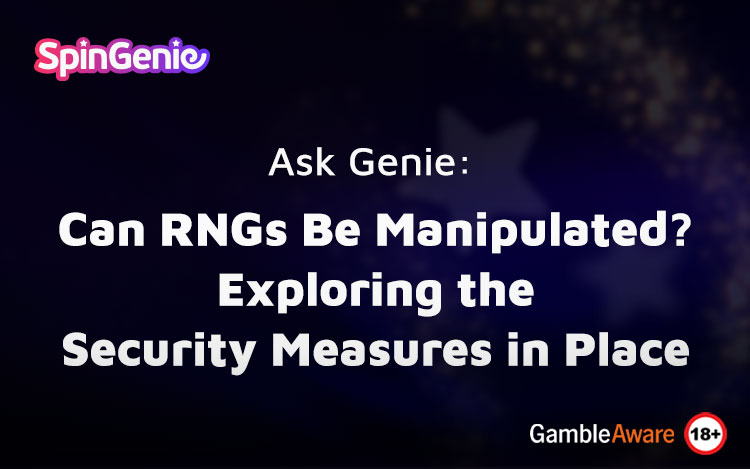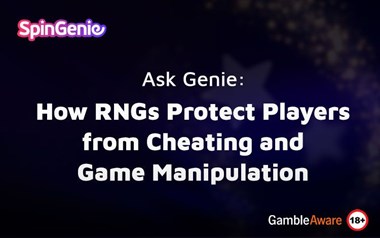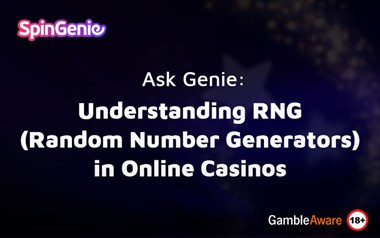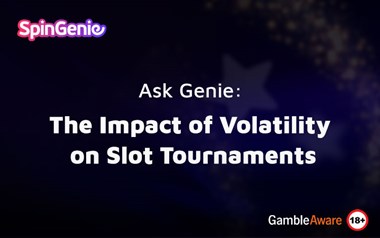Online casinos guarantee fair gameplay for their online casino games by utilising technology known as RNG or ‘random number generation’ While live dealer casino games implement random chance thanks to their human element (a roulette wheel will always be spun slightly differently each time), every online casino game uses with a virtual dealer, or in the case of slots, uses technology behind the scenes to ensure completely random and unpredictable outcomes. But with such a crucial role to play, how can players gaming at online casinos for real money be sure the RNG used in the game they are playing is fair and unmanipulated?
In today’s article, we’ll be exploring RNG software further, and discovering the security measures put in place to protect players from gameplay manipulation so you can play games at Spin Genie in a more informed way.
The Role of RNGs in Online Casinos
There is no such thing as true randomness as a pattern may arise after enough time; ad infinitum in some cases. However, when you consider that a conventional 5x3 reel video slot has millions of unique outcomes, random number generator software is about as random as it gets.
More crucially, as software, RNG outcomes are unaffected by the developer or casino (other than the mathematical model utilised by the game), eliminating bias and ensuring randomness.
RNG comes in two forms; HRNG, or ‘true’ RNG, is mechanically driven to generate unpredictability. The dealer at a physical casino is a true RNG since the human aspect makes the cards dealt and the wheel spins randomly. Online casinos use the second type of RNG called ‘pseudo-RNG’ (PNRG). Usually 'pseudo' has bad connotations, however pseudo-RNG in online casino games refers to the artificial software process used to create random outcomes.
These RNGs use system clock seed data and complex algorithms to generate random results with high accuracy and fairness which look something like this:
- The seed is a key that shows the algorithm's probable results.
- This data is then passed to the 'hashing algorithm', which utilises mathematical models like RTP, volatility, and variation to produce the outcome.
- Instead of showing this quantitatively, the software's application determines the results. Slots assign each value to a 'tile' (a reel position) and a picture.
- The player gets the result. All this mathematical magic happens in seconds, unnoticeable to the average player.
Can RNGs Be Manipulated?
RNG systems use complex algorithms and seed values to generate unpredictable results from high-precision timing sources. This description is beyond most of us, and so is manipulating RNG software! However, this doesn’t mean gameplay manipulation hasn’t occurred before; but its a story of the player manipulating the casino, not the casino manipulating the player; introducing Ron Harris.
When gambler Reid Errol McNea won $100,000 on a keno jackpot despite 1 million-to-1 odds at Bally's Park Place Casino in Atlantic City in 1995, officials quickly distrusted the win. Luckily, the US law at the time required state gaming officials to verify wins above $35,000. During their investigation, McNeal identified his accomplice, Harris as a Nevada computer tech. The resulting search yielded computer equipment, books, and notes on beating the RNG (the ‘hacking’ of the pre-internet era was a different world!).
In his day job, Harris checked and tested slot machines in Nevada gaming casinos. Officials discovered he worked directly with the computer chips of the popular video casino games found at brick-and-mortar venues at the time. Harris found he could use the information gathered from his day job to predict the Keno machine's following numbers. Harris served two years of a seven-year sentence and has been banned from casinos for life; he’d actually been stealing from various Las Vegas Casinos for over two years; albeit in smaller amounts which went under the radar.
This case highlighted that yes, virtual casino games could be hacked, but also that this manipulation could be detected and dealt with. This same hyper-vigilant attitude carried over as casinos entered the online age.
Game producers and regulatory bodies have tight security standards, making it virtually impossible to cheat an RNG by accessing proprietary software and changing the algorithm. Moreover, regulators are strict and diligent, thus rigging the game would certainly result in swift detection and penalty. All reputable online casinos are licensed and controlled by their local governments.
So, if you're a scammer with some computer know-how, the no-nonsense attitudes of regulators mean that there are easier ways to make a quick buck than trying to manipulate RNG software.
The Security Measures and Certifications Used to Protect Players
Looking deeper into the tech itself, modern online casino games use software called MD5, or ‘Message Digest Method 5’. This is a cryptographic hash technique that converts a string of arbitrary length into a 128-bit digest. The digests are stored as 32-digit hexadecimal numbers. Ronald Rivest created this algorithm in 1991 to give a method for digital signature verification. While that is certainly a crazy combination of words to digest, thanks to independent auditors and testers, players don’t need a computing degree to ensure the games they play are safe and fair.
- BMM Testlabs has been in business for over 30 years and is regarded as a leading authority. It works with casinos from multiple countries and can test any type of online casino game.
- iTech Labs has been in business since 2004 and works with brands in North America, Asia, and Europe. The brand highlights the regulations and limits of specific nations to ensure that its customers' game content complies with current licencing criteria.
- Gaming Laboratories International (GLI) certificates are in high demand among iGaming enterprises because they are valid in some of the strictest markets around the world.
- eCogra (eCommerce Online Gaming Regulation and Assurance) is based in London and is therefore the most well-known body among UK gamers. It examines methods and software used in online betting to protect player rights, ensure fair games, and verify supplier responsibility first.
Certification from regulatory bodies (more on these in the next section) and third-party auditors takes a lot of cost and effort to gain and uphold, and therefore the casinos themselves are also just as vigilant with their operations. The casinos' certification(s) and accreditation(s) are always clearly displayed on legitimate online casino sites; usually at the bottom of every web page.
Regulatory Oversight and Compliance
There are plenty of regulatory bodies which not only keep players safe from gameplay manipulation but also ensure that the casinos they oversee maintain high standards and follow the letter of the law for the region(s) they operate in.
The UKGC (United Kingdom Gambling Commission), MGA (Malta Gaming Authority), GBGA (Gibraltar Betting and Gaming Association), GSC (Isle of Man Gambling Supervision Commission), and AGCC (Alderney Gambling Control Commission), are some of the top gambling authorities in the UK. Online casinos must be regularly examined and audited to ensure they comply with regional laws and operate fairly and transparently to keep their licenses.
Some of the most prominent laws in the UK that casino operators need to follow include; The Gambling Act 2005 (GA) which provides legal definitions for common gambling terms like ‘betting’ and ‘prize’, The Gambling Commission Licensing Conditions and Codes of Practice (LCCP) which dictates the criteria to meet in order to be licensed, The Remote Gambling and Software Technical Standards (RTS), The Proceeds of Crime Act 2002, The National Lottery etc. Act 1993, and the Advertising Standards Authority (ASA) Codes which dictate how casinos can advertise gambling practices.
In the heavily regulated gambling business, non-compliant casinos face serious consequences that most people are unaware of. They may be fined or lose their licence, which can be devastating financially. Violating any of the laws mentioned above might result in serious legal consequences which could see company CEOs face jail time. Non-compliance can also damage a casino's reputation, affecting consumer loyalty.
Spin Genie Offers Secure and Safe Online Casino Entertainment
While the answer to the question posed in this article is ‘yes, RNGs can be manipulated’, the reality is that while it is still possible, it just isn’t worth it. No legitimate casino could risk the repercussions of manipulating RNGs, and the technical skill and effort it takes for a player or hacker to manipulate the software is also more effort than it is worth. In the casino world, the regulatory authorities are vigilant with a capital V, so any attempts to rig games will be quickly picked up on and harshly punished.
This is why licensing and regulation are so important to online casino sites as it is the biggest green flag to prospective players that their site is safe and secure, and the games they offer have been tested and confirmed as 100% fair.
At Spin Genie we’re licensed by the UKGC so you can play our extensive portfolio of games worry-free.













